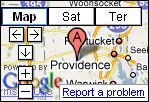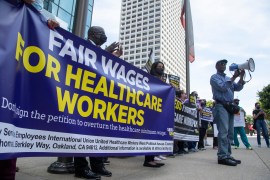Scituate, R.I., with its population of 10,000, has some big ideas about keeping its residents healthy. The town has created a means for all of its residents to have access to the most basic types of preventive health care, regardless of their ability to pay.
It all started in 2000 when town officials were looking to provide cheaper health insurance for their employees. This effort led to establishment of the Scituate Health Alliance, which now provides the town’s uninsured people about a hundred with primary health care services to head off serious health issues before they start. It is not health insurance. The program does not pay for hospitalizations or procedures such as root canals, hip replacements or cancer treatment. Instead, it focuses on annual physicals and sick visits to doctors, flu clinics, health screenings, eye exams and prenatal and breastfeeding information.
The alliance, a community-based non-profit organization, cobbles together the funding for this program from a variety of sources the town itself, its community block grants, and even from bake sales and walk-a-thons. The annual budget, which generally hovers around $30,000 a year, pays participating doctors $25 per patient per month. The only cost to the patient is $10 per visit. The reasoning behind the town’s plan is it will enable people to address the relatively minor health problems while also receiving the preventive services that go a long way toward lowering health care costs.
Dr. Michael Fine, a family physician, who serves as the vice president of the alliance, says Scituate’s approach could serve as a model for the rest of the country especially now as Congress wrestles with sweeping reform plans. KFF Health News staff writer Andrew Villegas recently talked with Fine who also directs a separate effort called Health Access Rhode Island that with the Rhode Island Academy of Family Physicians to help doctors provide reduced fee-for-service heath coverage to uninsured and underinsured patients about what lessons he’s learning and how it might help change health care in America. Edited excerpts of the interview follow.
Q: Could you explain how the program works?
A: It actually has two major components. One is a vehicle to provide primary health care and primary dental care to everyone who lives in the town of Scituate and doesn’t have employer-provided or government-provided health insurance. So, if you’re uninsured, the Scituate Health Alliance gives you a voucher and you can take that voucher to one of 16 practices across the state that will provide you primary care and to a couple of dentists. We’re also developing resources to be able to think about health in Scituate in a population-based way. To think about how to look at the incidents and prevalence of disease in a geographical way and then begin to build resources to address areas where different diseases are more common.
Q: Do you find that you’ve stretched the definitions of primary care?
A: We’ve tried to make a distinction between doing everything for everybody and doing what works for most people. I think we’ve sort of decided collectively to leave specialty care alone — [to let] the reform process, the insurance process deal with that — but to provide as a community the thing that matters.
Q: What do people participating in the alliance do if they get a serious condition like cancer?
A: Basically, the first thing those people have is a primary care doctor, who’s a huge ally, because the primary care doctor knows what treatment options are available. There are some resources for people without insurance for cancer treatment. In Rhode Island, we have a wonderful women’s cancer treatment program that’s run through the [state’s] department of health, so primary care doctors can connect people to that treatment program and get people cancer treatment in that way.
Q: These people are still, for all intents and purposes, uninsured. Is the primary care you provide intended to help ward off serious disease only?
A: It’s more than that. If you look at health policy numbers, 50 to 60 percent or more of patient encounters per day in the United States are between a patient and a primary care physician, so the bulk of what the medical service people consume is primary care. So what we’re providing is the medical service that people use. When you provide primary care, you are providing the service people need and keeping them from having to go to places that are expensive and may be dangerous. You know, making sure specialty services are used when they’re needed but aren’t overused and don’t drive up cost in the system.
Q: What do you think about the health care reform proposals in Congress?
A: I think the journey of a thousand miles starts with a single step. That we’re trying to do something is a good thing. The basic pieces of health insurance reform [that are] moving us toward community rating is a good, if expensive, thing. But I also think we’re leaving out a huge potential opportunity, which is, if we give primary care to all Americans and do just that, it would cost us an extra, depending on whose numbers you use, $16 billion to $24 billion per year. But it would probably save us $200 billion to $300 billion per year. Because people, if they had access to primary care – easy, free access – they’d use primary care first and not find themselves walking down the path of being over-treated and overdosed, which is what lots of what the health care system does.







